I confess I have never been wild about the World Travel Market – its central hall was the site of my personal “Road to Damascus” several years ago when I experienced the full extent to which tourism has become an industrial production and consumption machine.
I admit to being overwhelmed by the sheer scale, busyness and sterility of the event where products are pushed and deals done; brochures and media stuffed into plastic bags then discarded; and sustainable clichés fall like feathers from the upper galleries onto the hard selling activity in cubicles on the shop floor.
Walking the central hall this year I felt a visceral inner and outer tussle between despair and hope.
The number of “responsibility” seminars was, encouragingly, greater than ever before but still totally outnumbered and out attended by sessions devoted to trends, technology, social media, and market segments. Within the responsible tourism stream, the same pattern applied. Subjects like “Increasing the local economic impact” and ‘Using responsible travel to drive sales” attracted far more participants than subjects like reducing energy and water. (Note: I learned much from these sessions; applaud and thank organisers, speakers and Jeremy Smith for his excellent distillation: 10 things I learned from WTM 2014 with great links to speaker interviews)
There’s a simple explanation for the topic and attendance bias I suppose – the vast majority of people paid to attend WTM are engaged in marketing and sales. It is a market after all. But that explanation points to an issue that was hardly mentioned– and that’s the G-word: Growth. Tourism succeeds when it grows because we have defined success as more. Because growth is the goal, we allocate resources to the people, technology and processes that produce growth and measure our progress towards sustaining it.
And that leads me back to despair – because until we describe our predicament accurately and delve deeply into the root cause of the challenges we face, as an industry and as humanity, we’ll waste time and scarce resources tinkering at the edges. Our well intended “busyness” will keep thousands employed, produce endless conference fodder, and generate hundreds of checklists, certification bodies, “new” green initiatives, declarations and reports but won’t actually move us off the road to catastrophe.
The deeper problem is that more has become the end and not the means.
Somewhere in the last 60 years, while we’ve been so busy expanding, we’ve made it the responsibility of commerce to grow but not necessarily improve the lives of the community in which it takes place. GDP is used to measure growth in activity not welfare. We’ve become so used to growing and to the benefits that we believe it brings, that we’re literally hooked. We certainly behave like addicts. We seem to need more of it to feel its benefits. We complain and suffer when growth slows or stops. We associate a life without it as being uncomfortable at best and possibly life threatening at worse and we can also be blind to the hurt we cause ourselves and others.
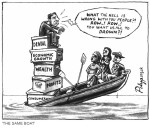
(c) polyp@polyp.org.uk
As is also the case with addiction, the object of our craving is now causing more harm than good and producing a number of side effects that threaten our collective welfare. Many of these side effects – the pressure on biodiversity, the mistreatment of animals held captive; growth in human trafficking, and social inequity — were rightly included as responsible tourism topics at WTM. But climate change, universally recognized as one the biggest threats to human life and prosperity, was not officially assigned any airtime this year despite the urgency now communicated by 97%+ of scientists (see Guardian summary). Climate change was not named as a topic in any of the seminar sessions. Yet climate change is surely a major and critically important symptom of an organ (in this case, our life supporting ecosphere), adjusting to the effects of an addiction afflicting its dominant species.
Addicts, we know, spend increasing amounts of time as their disease progresses, denying and concealing their dependence. The absence of sessions at WTM in which neither climate change nor the negative impacts of growth were officially discussed, and the complete absence of their mention in the brochure used to launch the “New” 10YFP Programme on Sustainable Tourism all signal avoidance behaviours classically used by addicts not yet ready for rehabilitation.
Finally, this statement from the Director of Sustainable Development of the UNWTO in the only article labeled “Responsible Tourism” in WTM Business, shows what really matters:
“The tourism sector is embracing responsible tourism not as an option, but as a condition for its continuous growth”
Forgive me if the thought of sterilized needles and methadone replacement comes to mind.
So What’s Wrong with Growth?
The problem is fundamentally a semantic one. The verb “to grow” has three meanings:
Over the course of time, we in tourism have assumed that more of an entity or state is better than equal or less over time. Look at any tourism strategy from the smallest of Convention and Visitor Bureaus, National Tourist Boards or even the UNWTO and you will see that the goal is to grow tourism by a percentage increase over its performance the previous year. Performance is measured in the trips, people, and their spending at the host destination. In short, size matters and the shared meaning of growth is MORE.
So what’s wrong with that?
Well, there wasn’t much wrong with that at all when we started out some 60 years ago deploying mass transport to enable working men and women and their families have a holiday, visit parts of their country or venture to foreign lands. The tourism “industry” sen sibly applied what had proved to be a very proficient method of making and selling things – an industrial system of production and consumption and, as a consequence, during the span of one human lifetime, tourism became a global economic sector of enormous importance contributing 10% of GDP and keeping over 250 million people in a job.
sibly applied what had proved to be a very proficient method of making and selling things – an industrial system of production and consumption and, as a consequence, during the span of one human lifetime, tourism became a global economic sector of enormous importance contributing 10% of GDP and keeping over 250 million people in a job.
Since World War 2, tourism has brought benefits to virtually every country; lifted people out of poverty through accessible employment; created an untold number of entrepreneurial opportunities; enabled millions to enjoy face-to-face encounters with people of very different cultures; help fill public treasuries with useful tax dollars that were applied to education, health care and other social services; supported the development of important infrastructure and provided billions of dollars in foreign exchange and investment capital.
Phew! Surely that’s an accomplishment to be proud of?
Yes, it is. But it’s not the complete or honest story. It ignores the inefficiencies and inequities built into the industrial system that only become apparent over time. So duplicating that rate of growth going forward may not bring more “good” with it. There are reasons why continuing to grow bigger is neither desirable nor at all likely. Let’s tackle the issue of likelihood first.
It will be difficult to sustain such growth forever because the operating model on which it was based was designed in and for a different world. The conditions that ensured its success are fast disappearing.
The model flourished when energy was cheaply available from abundant, accessible sources of fossil fuel; when there were literally hundreds of new, virtually empty and exotic places to explore and cultures to get to know; when host communities needed cash and investment to play in a global cash economy; when there were vast quantities of resources, capital and know-how to deploy with limited debt to be paid; and when huge numbers of people were determined to put two decades of war behind them and improve their material well-being.
Continuing to grow in size is not desirable now simply because the world is full (1), and because the industrial model of production and consumption contains within it certain characteristics and flaws that worsen with time. For the purpose of this post, I’ll concentrate on just four of the biggest:
- Tourism generates wastes and uses resources at a rate that can be accommodated in its early stage of development but not sustained after it has reached a certain scale and pace of growth. Mitigating the negative effects of climate change (most of which will hurt tourism) now requires that all economies drastically reduce their production of CO2 to zero by 2050. That is because the atmosphere can only absorb a finite amount of CO2 IF we wish to keep average temperatures at a level in which human society can flourish (see previous posts on subject here and here).
- Tourism is on a course that would increase its carbon contribution by 150% at precisely the time when it needs to focus on decreasing its absolute contribution to zero! Even if all ground operations became carbon-negative, the airline sector – vital to international tourism and responsible for 40% of tourism emissions now – will be a major contributor to the global total by 2050 if current forecast/ growth rates are achieved. Despite all the talk about being responsible, not a single nation has a carbon mitigation strategy for the tourism sector (2)
- With a human population expected to increase by a further 2.5 billion between now and 2050, tourism will also face increasing competition for land, water and food in areas where – thanks to the effects of climate change – public funds may be unable to cope with the basic needs of resident populations. According to UNEP (3), mass tourism leaves an average of 5 cents in the host country for every $1 spent by visitors. As the costs of mitigation and adaptation to climate change and the demands of a burgeoning visitor population rise, where will these hosts find the resources to supply adequate waste management, security, health and transportation services in addition to meeting the needs of their own growing population?
 Mass tourism has a tendency to produce diminishing returns to investors and host communities over time. Tourism demand is highly volatile, seasonal and beyond the control of host destinations. When demand ebbs there is a tendency to discount and that response, combined with a lack of control over capacity, leads to a general fall in income per transaction. Price discounting necessitates either rigorous cost cutting or vertical and horizontal integration which can exacerbate a tendency for service levels and customer satisfaction to also decline.
Mass tourism has a tendency to produce diminishing returns to investors and host communities over time. Tourism demand is highly volatile, seasonal and beyond the control of host destinations. When demand ebbs there is a tendency to discount and that response, combined with a lack of control over capacity, leads to a general fall in income per transaction. Price discounting necessitates either rigorous cost cutting or vertical and horizontal integration which can exacerbate a tendency for service levels and customer satisfaction to also decline.
What can we do? There are two answers and the clue lies in the second and third definition of the verb “to grow.”
First, we re-define “growth” as better and second, we grow up!
Re-defining Growth As “Better and better for more”
Let’s shift our focus to a more inspiring end goal – enabling all stakeholders and especially the communities that welcome guests to flourish; in other words express and exude health and vitality; be resilient; open to change and qualitative development. In short thrive and prosper and become all they can be.
Let’s make sure the growth we get is:
- honest (acknowledges and deals with costs and harm as enthusiastically as it promotes the benefits);
- fair (ensures the benefits accrue to all stakeholders equitably); and
- natural (is life enhancing and in harmony with the natural rhythms of life).
Let’s make sure that what host communities deliver and what guests experience constitute an antidote to the types of uneconomic growth that prevail today in many parts of the world:
- jobless growth, where the economy grows but produces few jobs or ones that are poorly paid and erode the dignity and health of the worker;
- ruthless growth, where the proceeds only benefit speculators, and the rich or powerful:
- voiceless growth, where economic growth is not accompanied by extensions of democracy or empowerment and where residents are deprived as say in who and how many guests they welcome; and
- futureless growth, where the present generation squanders resources needed by future generations.
Note though: The challenge when discussing tourism from a global perspective is that it ignores the enormous variability in circumstances between destinations. Volume growth may be needed in many destinations where there is over capacity brought about by a “build it and they will come” approach. Conscious Travel is not only about generating higher yields but empowering hosts communities to make informed decisions about how much, what kind, where and when. In some instances, more visitors are needed to ensure vitality and resilience.
We Grow Up!
Growing from an adolescent to an adult requires understanding that the world doesn’t revolve around you personally; that you are a member of a community on which you depend and to which you are obliged. It’s a reciprocal relationship of respect and caring. It also recognizes that there are limits. You neither can nor wish to keep growing bigger. You expect to change as you pass into adulthood – both physically and emotionally. You look forward to exploring how you can express your uniqueness within the constraints set by your culture and environment. While sometimes you’ll kick against those constraints and may even succeed in redefining them; other times, you’ll see that they are useful and stimulate more creativity and innovation.
You stop growing bigger when you grow into adulthood – you mature; you start to want to express yourself; to become more, to stretch – but qualitatively not quantitatively. You want to contribute to a larger whole. You want to be the best you can be. You strive to go where no man has gone before. That yearning diminishes much more slowly than your body ages – take that from me!!
And this process is totally natural!
In nature, nothing grows forever except perhaps the universe itself, (it’s been expanding outwards at a phenomenal rate for 13.7 billion years).
There are no straight lines in nature. What looks like a straight line in nature is simply a part of a fractal curve that appears throughout life itself. It has what sounds like a mysterious name – it’s called a Sigmoid curve. But Sigmoid is just Greek for the letter S and the curve describes the letter lying on its back and illustrates a natural cycle that pervades all life.
Thanks to Dr. Butler, the tourism community is familiar with the Sigmoid Curve even though they aren’t recognized as such. Dr Butler introduced the most enduring model of tourism destination development but, while he correctly named it as the Tourism Area Life Cycle Model (TALC), he based it on a concept derived from the industrial model of production and consumption – the life cycle of products. It’s an indication of the author’s modesty, that Dr. Butler is surprised by its popularity, potency and durability (4).
The TALC model is applicable not just to individual resorts – each of which sits at its own unique point on the curve – but to mass industrial tourism as a whole. If you define success as volume – as opposed to net benefit – you’ll place mass tourism between stages 3 and 4 on the TALC curve. But if measured in terms of its net benefit then we’re most definitely at or approaching stage 4.
Evidence for Hope
We don’t need to tear down the old model. The alternative model is emerging all around 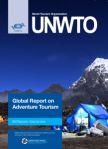 us. Both need to co-exist while the alternative grows in strength and complexity. Several pioneers of a new, less harmful, more beneficial model were acknowledged and applauded by receiving Responsible Tourism Awards at WTM and many others attended and contributed to the sessions that accompanied the trading on the exhibit floor. At the WTM, the UNWTO and Adventure Travel Trade Association (ATTA) launched their jointly produced Global Report on Adventure Tourism in which ATTA revealed from its Industry Snapshot 2014 that an estimated 65.6% of the total trip cost of an adventure package remains in the destination(s) visited – a vast improvement on the 5% estimated by UNEP for mass tourism. Proof that there is huge potential to improve the net benefit to host destinations.
us. Both need to co-exist while the alternative grows in strength and complexity. Several pioneers of a new, less harmful, more beneficial model were acknowledged and applauded by receiving Responsible Tourism Awards at WTM and many others attended and contributed to the sessions that accompanied the trading on the exhibit floor. At the WTM, the UNWTO and Adventure Travel Trade Association (ATTA) launched their jointly produced Global Report on Adventure Tourism in which ATTA revealed from its Industry Snapshot 2014 that an estimated 65.6% of the total trip cost of an adventure package remains in the destination(s) visited – a vast improvement on the 5% estimated by UNEP for mass tourism. Proof that there is huge potential to improve the net benefit to host destinations.
We don’t need any more divisions; no more “them” and “us”. Those of us who have been working in all aspects of the new, whether it be in sustainable, responsible, geo, fairtrade, or social tourism; whether our focus is on environment or social issues; or whether we’ve been involved for years or minutes, need now to join hands. Some can focus on building inspiring working prototypes of the new. Others can build bridges with the keepers of the old until it makes sense for them to move.
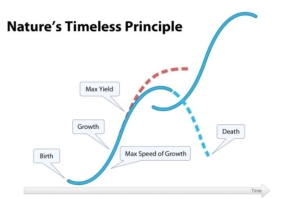 What we do need is coherent thinking as a “we” tied together by a common vision for humanity that can thrive and flourish on a living planet.
What we do need is coherent thinking as a “we” tied together by a common vision for humanity that can thrive and flourish on a living planet.
What we do need is to understand nature’s timeless principles to recognise when it’s time for transformation, maturation, evolution (5).
We also need courage to undertake a fearless inventory and speak the truth. It was Chris Doyle’s article for the WTM that persuaded me to attend and I was honoured to join him in the two lively and provocative sessions organized by the Adventure Travel Trade Association (ATTA).
This is the most exciting time to be alive. It’s the very first time in human history when individual humans have the capacity to be aware that their personal choices do matter in the evolutionary trajectory of a species, no less!
No wonder we’re being called to stop growing in size but in wisdom, insight, maturity and compassion. Because tourism plays such a direct role in connecting people to each other in places where they can experience the power and beauty of nature and discover their true identity, we must step up into a much grander sense of purpose.
More of us must engage in the task of building a better model – shifting from one S curve to another.
It all makes that brightly lit central hallway in a box called Excel seem rather unappealing, don’t you think? There’s a mysterious and amazingly beautiful world of living beings out there in the sunshine by the river – let’s join them there and flourish.
References and Reading
(1) Economics in a Full World, Herman Daly, Scintific American September 2005. Download here
(2) Climate Change Implications for Tourism University of Cambridge Download pdf here
(3) UNEP, Negative Economic Impacts of Tourism – available online here
(4) Tourism Area Life Cycle R.W. Butler, in Contemporary Tourism Reviews, Goodfellow Publishers, Oxford, 2011
(5) See Giles Hutchins: Transformational Times Call For Transformational Minds.
Personal Note: This post is the first in a series of reflections about how tourism can flourish in a post carbon, post growth society. The “book,” which so many of my dear supporters have said I must write, is finally in the making. It will be so much better if you add your comments to these blogs, share and encourage others. No individual, no enterprise, no community can go it alone. The stakes are too high.
RELATED POSTS
When will tourism industry start talking sensibly about tourism growth? Author Jeremy Smith, founder Travindy. Another call for this discussion to take place.
WTM 2015 Responsible Tourism Day – Shock and Awe
One year later in 2015, resistance to contemplating another model i.e. one that does not deed on volume growth acme very evident.
Tourism What’s the Point ? (just in case we have forgotten)

 November 12, 2014
November 12, 2014 
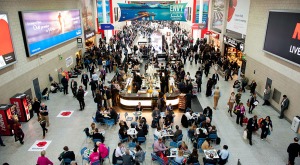

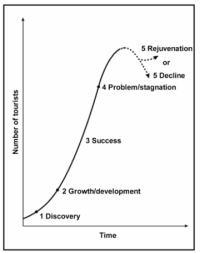




Thank you, Anna, for this eloquent, insightful essay. Also, thanks for your more recent article on climate scientist Kevin Anderson’s panel discussion with travel industry and government executives at the WTM 2015. A search leading to that article is how I found your website. The video of that discussion was very interesting indeed, and it seems the panel was a good step toward addressing the despair you expressed in the present essay.
LikeLike
Reblogged this on TRAVEL & ADVENTURE in the WESTERN BALKANS and commented:
I was lucky enough to attend both the ATTA sessions mentioned in this piece. The problem of constantly chasing growth is common to all industries, but in Tourism directly values assets (culture , nature , escape , tranquility) which are the most vulnerable to volume growth. The case was made very convincingly for a new approach, to consider the travel community not as an industry, to value qulaity experiences over quantity products. In the Western Balkans we have a chance to get this right , we must do.
LikeLike
Thank you for addressing the stark reality that 99% of us are forgetting, that we can’t just simply grow for growth’s sake. Whether in tourism or not. Thank you for putting into perspective how we need to become better and embrace a more inclusive model of tourism (NOT “all-inclusive which is actually exclusive!). There are fascinating parallels here with Naomi Klein’s new book – This Changes Everything, Capitalism vs the Climate – which also addresses growth and the desperate need for a new economic model.
LikeLike
Hi Kelly – thanks for the comment. There’s a huge movement outside of tourism that is re-examining capitalism, growth, democracy etc and you are right Naomi Klein, who has a great sense of timing, is giving her very effective voice to that. The hard work now is to put flesh on the bones but it’s a really deep and radical change that’s required.
LikeLike
Thanks Anna. I felt much the same as you about the WTM previously. I have to say this year I really enjoyed it! Yes, partly because there was more RT, more sessions, more people involved, more networking, more awards, more reporting, more awareness.
Sometimes it does feel like we’re covering the same old ground. Many smaller local operators and adventure co’s have been RT-oriented for many years and large-scale TUI, rightly applauded for its work. But sometimes I wonder how many times do we hear the same things, are we going to keep on talking about what’s wrong with a non RT-approach. Things just don’t seem to change quickly enough. But I’m impatient!
As we do still need to educate; there is a huge tranche of operators who seem to bypass RT, possibly with neither the volume, nor specialism, nor interest, nor bravery, to compete on anything but price. Of course they could if they took that decision, but it takes bravery and new skills and knowledge to take that step aside. This is where it’s great if RT is becoming a condition, not an option. And where the education of what’s wrong is still so very important. If I say I work in responsible/sustainable tourism, the average Joe Bloggs on the street in the UK doesn’t really understand what it is. But hen a taxi driver surprises you with an eloquent conversation on conservation.
So I think it has started to grow, and not just in volume. There are possibly more influential people, events like the RT Fringe were more grown up this year, the Awards are growing in stature. Yes it can be schmaltzy at points, but if that is what it takes to bring in the non-niche, to be accepted as a way of doing business, then so be it, for now. It’s just finding its voice. It’s never been a shy child, if anything a bit of a rebel misunderstood, turned off and dismissed by many, who are now paying attention due to its growing maturity. A bit like Climate Change, it’s been too overwhelming to consider.
To me, the next phase has to be passing the exams. Having the proof, showing the evidence that not only has the work been done but the approach gives results better than the alternative, having positive actions and positive stories, by the masses. And, looking to other sectors – how is tourism’s compared to theirs? Who is on a similar trajectory, who has righted a path? That’s not to evade tourism’s responsibility for Climate Change, but to bring sectors together to take collective action. That’s what I’d like to see more of in the future.
LikeLike
Thanks Vicky – there’s so much new thinking happening outside tourism and the place where the diverse sectors can best come together is in community.
LikeLike
Anna, another stimulating read. The cognitive dissonance regarding growth while in practical terms ignoring resource limitations and Climate Change is shocking to behold. I my opinion this is a challenge facing us all not just a sector of the travel industry. Growth in the present model is dependent upon consumption of natural resources on a cradle to grave model. The consumer is also complicit in this race to the top of the curve.
At this moment in time it is the mass tourism industry led by TUI that seems to be more open about their carbon footprints, but I’m hoping this will change soon. I long for the day when all travel will come with carbon and water and other ecological footprint metrics so that we can make informed travel choices, but in the meantime I look forward to your book.
LikeLike
Thanks John – I’m encouraged to keep at it!! Great to meet in person the other day.
LikeLike
Thanks for putting together and sharing such a riveting article Anna. The growing unrest all around us -for economic, political and social reasons – will further compound the problem of more growth in those destinations as they try to make up for lost time, and in some cases even at the cost of ‘less’ responsible tourism. Further, given the poor track record of some destinations with caring for their environments, wonder if the prototype being built by the UNWTO to overcome seasonality is coming at a good time. Seasonality, though bad from a economic stand point is probably a boon for the environment to recuperate before the start of the next holiday season. But are we grown up enough to say No!
LikeLike
Thankyou Rajith for contributing your thoughts. You raise an interesting point regarding seasonality. As scientists gain a better understanding of earth as living system, we detect that it too breathes in and out and daily, seasonal variations serve many key purposes. Yet we wonder in the west why there is so much illness and depression when in addition to the toxins we absorb in our diets, the stresses we impose on our lives, we minimise sleep and have eliminated a day of rest from our weekly calendars. There’s no simple answer to any of these issues but I am convinced that acknowledging local conditions, needs and preferences is essential. Spreading demand across more of a year makes sense providing it does not violate the need that all living beings have for rest and recuperation! I love your approach and enjoyed your web site: http://www.thetravelinggecko.com. Thanks for dropping by – come back soon
LikeLike
Reblogged this on SUCHITOTO TOURS.
LikeLike
Thank you, Anna! My blood pressure started rising when I read the quote from the Director of Sustainable Development of the UNWTO re “The tourism sector is embracing responsible tourism not as an option, but as a condition for its continuous growth.” This quote is shocking in its utter lack of morality. Amongst other things, it seems to me as though the Director is advocating for greenwash. But we must not despair at such an utterly irresponsible, thoughtless comment, because there are a few of us who understand the predicament facing humanity and we will continue to educate and encourage the rest to grow up … soon, please!
LikeLike
Thanks for your comment Val- much appreciated as the purpose of the post was to stimulate discussion!
I think that tourism’s growth did serve a purpose for a while – our problems arise when we don’t acknowledge that it’s time to shift the nature of growth from more to better. Personally I don’t consider the statement immoral as much as mistaken. I quoted it not to point a finger but to illustrate how deeply the growth imperative is embedded in our institutional and personal consciousness.
Tourism is a derivative of a larger economy and draws its operating methods and goals drawn from the prevailing worldview which defines success as material acquisition. The challenge I think is that we haven’t spent enough time envisioning an alternative so simply stick to what we know in order to feel and appear successful.
My approach changed when I realised that you can’t have butterflies without caterpillars or mature adults unless they have played as children. Good luck with your thesis – can’t wait to read the fruits of your labour.
LikeLike
As a small self catering business in Cheltenham UK we have made every effort to promote sustainability – with the building refurbishment and developing relationships with local suppliers. This has included bio mass heating, PIR lighting, solar, ecologically friendly insulation, use of original and local building materials and labour……..I can’ help but think if we were overseas that the effort would pay dividends. In the UK, by contrast, there seems little marketing incentive for the extra (substantial) financial investment.
LikeLike
Hello Andrew – thanks so much for your comment. I looked at your web site and your establishment does look very beautiful so it’s good to know that of the highly responsible approach you have taken. I was surprised to see nothing on the site about your efforts and achievements in this regard so they may be unappreciated. I think many (not all) guests are interested in their hosts as well (and in some cases more). I get the impression you have made these investments not only in the hopes there will be a return but because it is the right way to operate in 2014. It’s a good story to tell. Thanks again.
LikeLike
I applaud your courage to voice unpopular truths, Anna. Best wishes to you and the people in your industry.
LikeLike
Thanks Laura. It’s been a pleasure participating with you on the Pachamama Game Changer Intensive that inspired me to gently push the edge of provocation. We live in interesting times when reflection and honest discussion is vital.
LikeLike